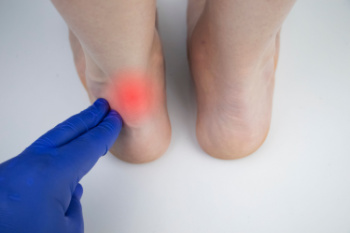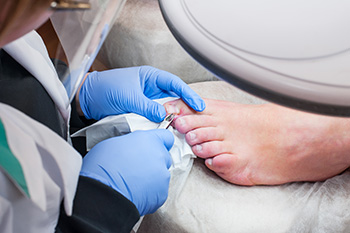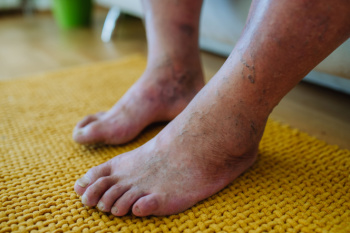Connect With Us
Blog
Items filtered by date: August 2024
Pain and Burning in the Achilles Tendon

Pain and burning sensations in the Achilles tendon often stem from various causes related to overuse and strain. Repetitive activities, especially those involving running or jumping, can lead to inflammation known as Achilles tendinitis. This condition arises when the tendon, connecting the calf muscles to the heel bone, becomes irritated from excessive stress. Another common issue is Achilles tendinosis, where chronic degeneration of the tendon tissue causes discomfort and a burning feeling. Tight calf muscles and wearing improper footwear can also contribute to tendon pain. To address these issues, it is vital to rest the affected area, and incorporate stretching exercises to improve flexibility. If you have pain in your calf, it is suggested that you consult a podiatrist who can accurately diagnose Achilles tendon injuries, and offer effective treatment methods.
Achilles tendon injuries need immediate attention to avoid future complications. If you have any concerns, contact Rahil Baxamusa, DPM of Illinois. Our doctor can provide the care you need to keep you pain-free and on your feet.
What Is the Achilles Tendon?
The Achilles tendon is a tendon that connects the lower leg muscles and calf to the heel of the foot. It is the strongest tendon in the human body and is essential for making movement possible. Because this tendon is such an integral part of the body, any injuries to it can create immense difficulties and should immediately be presented to a doctor.
What Are the Symptoms of an Achilles Tendon Injury?
There are various types of injuries that can affect the Achilles tendon. The two most common injuries are Achilles tendinitis and ruptures of the tendon.
Achilles Tendinitis Symptoms
- Inflammation
- Dull to severe pain
- Increased blood flow to the tendon
- Thickening of the tendon
Rupture Symptoms
- Extreme pain and swelling in the foot
- Total immobility
Treatment and Prevention
Achilles tendon injuries are diagnosed by a thorough physical evaluation, which can include an MRI. Treatment involves rest, physical therapy, and in some cases, surgery. However, various preventative measures can be taken to avoid these injuries, such as:
- Thorough stretching of the tendon before and after exercise
- Strengthening exercises like calf raises, squats, leg curls, leg extensions, leg raises, lunges, and leg presses
If you have any questions please feel free to contact our office located in Crystal Lake, IL . We offer the newest diagnostic tools and technology to treat your foot and ankle needs.
Types of Ingrown Toenail Surgery

When home treatments fail to alleviate the pain and discomfort of an ingrown toenail, surgical intervention may become necessary. A podiatrist plays an essential role in diagnosing the severity of the ingrown toenail and recommending the most suitable treatment. Surgery for ingrown toenails is generally reserved for severe cases, especially if there's an infection or if the individual has a condition, like diabetes, that complicates healing. One common surgical procedure is the wedge resection, where a portion of the toenail is removed to prevent it from growing into the skin. In more extreme cases, a total toenail removal might be performed, which involves the complete removal of the nail to prevent recurrence. Another option, matrixectomy, involves the removal of the nail bed to stop future nail growth altogether. These procedures are typically performed under local anesthesia, allowing for quick recovery. After ingrown toenail surgery, maintaining a clean and dry wound is essential to prevent infection. If you have an ingrown toenail that is causing extreme pain, it is suggested that you make an appointment with a podiatrist to find out if surgery is needed.
Ingrown toenails may initially present themselves as a minor discomfort, but they may progress into an infection in the skin without proper treatment. For more information about ingrown toenails, contact Rahil Baxamusa, DPM of Illinois. Our doctor can provide the care you need to keep you pain-free and on your feet.
Ingrown Toenails
Ingrown toenails are caused when the corner or side of a toenail grows into the soft flesh surrounding it. They often result in redness, swelling, pain, and in some cases, infection. This condition typically affects the big toe and may recur if it is not treated properly.
Causes
- Improper toenail trimming
- Genetics
- Improper shoe fitting
- Injury from pedicures or nail picking
- Abnormal gait
- Poor hygiene
You are more likely to develop an ingrown toenail if you are obese, have diabetes, arthritis, or have any fungal infection in your nails. Additionally, people who have foot or toe deformities are at a higher risk of developing an ingrown toenail.
Symptoms
Some symptoms of ingrown toenails are redness, swelling, and pain. In rare cases, there may be a yellowish drainage coming from the nail.
Treatment
Ignoring an ingrown toenail can have serious complications. Infections of the nail border can progress to a deeper soft-tissue infection, which can then turn into a bone infection. You should always speak with your podiatrist if you suspect you have an ingrown toenail, especially if you have diabetes or poor circulation.
If you have any questions, please feel free to contact our office located in Crystal Lake, IL . We offer the newest diagnostic and treatment technologies for all your foot care needs.
Let the Expert Treat Your Ingrown Toenails
Causes of Morning Heel Pain

Morning heel pain can disrupt your day before it even begins, often stemming from conditions such as plantar fasciitis or Achilles tendinitis. Plantar fasciitis is caused by irritation of the thick ligament on the bottom of the foot. It leads to stiffness or pain, especially noticeable in the morning. Achilles tendinitis involves inflammation of the tendon that connects the calf muscle to the heel, causing persistent discomfort. Other factors like stress fractures, rheumatoid arthritis, or hypothyroidism can also contribute to morning heel pain. A podiatrist can conduct an examination to accurately diagnose the cause of morning heel pain. Specialized treatments, such as custom orthotics or targeted exercises may be suggested to address the issue. This foot doctor can also provide advice on footwear and preventive measures to avoid recurrence. If you are experiencing heel pain in the morning, it is suggested that you schedule an appointment with a podiatrist for an exam, diagnosis, and treatment.
Many people suffer from bouts of heel pain. For more information, contact Rahil Baxamusa, DPM of Illinois. Our doctor can provide the care you need to keep you pain-free and on your feet.
Causes of Heel Pain
Heel pain is often associated with plantar fasciitis. The plantar fascia is a band of tissues that extends along the bottom of the foot. A rip or tear in this ligament can cause inflammation of the tissue.
Achilles tendonitis is another cause of heel pain. Inflammation of the Achilles tendon will cause pain from fractures and muscle tearing. Lack of flexibility is also another symptom.
Heel spurs are another cause of pain. When the tissues of the plantar fascia undergo a great deal of stress, it can lead to ligament separation from the heel bone, causing heel spurs.
Why Might Heel Pain Occur?
- Wearing ill-fitting shoes
- Wearing non-supportive shoes
- Weight change
- Excessive running
Treatments
Heel pain should be treated as soon as possible for immediate results. Keeping your feet in a stress-free environment will help. If you suffer from Achilles tendonitis or plantar fasciitis, applying ice will reduce the swelling. Stretching before an exercise like running will help the muscles. Using all these tips will help make heel pain a condition of the past.
If you have any questions please contact our office located in Crystal Lake, IL . We offer the newest diagnostic and treatment technologies for all your foot and ankle needs.
The Importance of Diabetic Foot Care

Diabetes can cause nerve damage and impair wound healing in the feet, leading to serious complications like ulcers. Proper foot care is essential for diabetics to maintain foot health. This includes always wearing well-fitting shoes to prevent injuries, even indoors, where unnoticed cuts can occur. Daily foot inspections are important in order to detect any abnormalities, such as abrasions or discolorations early. Promptly seeking care from a podiatrist for any concerning signs can prevent minor issues from escalating into ulcerated wounds, or gangrene. By prioritizing foot health with these proactive measures, diabetics can significantly reduce the risk of complications and ensure their feet remain healthy and functional. For detailed information on diabetic foot care as well as regular foot checkups, it is suggested you make an appointment with a podiatrist.
Diabetic foot care is important in preventing foot ailments such as ulcers. If you are suffering from diabetes or have any other concerns about your feet, contact Rahil Baxamusa, DPM from Illinois. Our doctor can provide the care you need to keep you pain-free and on your feet.
Diabetic Foot Care
Diabetes affects millions of people every year. The condition can damage blood vessels in many parts of the body, especially the feet. Because of this, taking care of your feet is essential if you have diabetes, and having a podiatrist help monitor your foot health is highly recommended.
The Importance of Caring for Your Feet
- Routinely inspect your feet for bruises or sores.
- Wear socks that fit your feet comfortably.
- Wear comfortable shoes that provide adequate support.
Patients with diabetes should have their doctor monitor their blood levels, as blood sugar levels play such a huge role in diabetic care. Monitoring these levels on a regular basis is highly advised.
It is always best to inform your healthcare professional of any concerns you may have regarding your feet, especially for diabetic patients. Early treatment and routine foot examinations are keys to maintaining proper health, especially because severe complications can arise if proper treatment is not applied.
If you have any questions please feel free to contact our office located in Crystal Lake, IL . We offer the newest diagnostic and treatment technologies for all your foot and ankle needs.
Blog Archives
- March 2025
- February 2025
- January 2025
- December 2024
- November 2024
- October 2024
- September 2024
- August 2024
- July 2024
- June 2024
- May 2024
- April 2024
- March 2024
- February 2024
- January 2024
- December 2023
- November 2023
- October 2023
- September 2023
- August 2023
- July 2023
- June 2023
- May 2023
- April 2023
- March 2023
- February 2023
- January 2023
- December 2022
- November 2022
- October 2022
- September 2022
- August 2022
- July 2022
- June 2022
- May 2022

